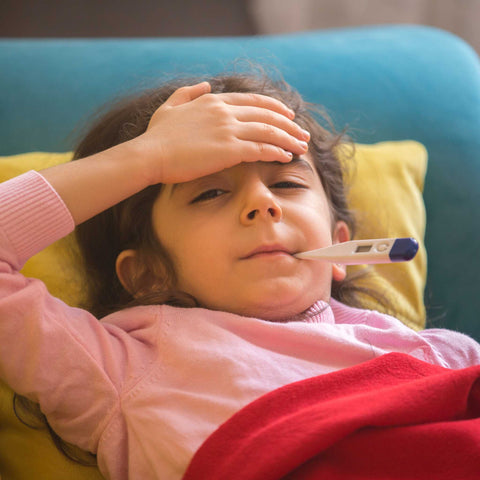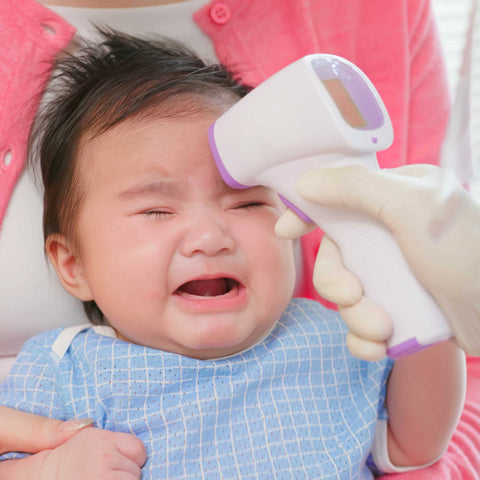Understanding Common Childhood Illnesses
Every parent knows that sniffles, coughs, and tummy aches are part of the package with little ones. While many of these are par for the course in childhood, it’s crucial to know how to monitor symptoms effectively.
Recognizing the difference between a minor issue that can be treated at home and something that might be more serious is key to ensuring your child's health and well-being.
Deciding on Home Care vs. Medical Attention
Most childhood illnesses, like colds or mild gastroenteritis, can be safely managed at home with rest, hydration, and over-the-counter remedies. However, certain symptoms—a high fever, persistent pain, or unusual lethargy—should trigger a visit to the doctor.
It's all about balancing caution with care: understanding when a symptom is just a part of a typical illness and when it's a sign of something that requires professional medical attention. This knowledge empowers you as a parent to make informed decisions about your child's health.
Understanding Common Symptoms
Navigating Colds and Flu
Colds and flu are commonplace in the lives of children, characterized by symptoms like a runny nose, cough, and mild fever. While these symptoms can often be unsettling, they typically don't require a doctor's visit and will resolve with rest and fluids.
However, if your child experiences high fevers, difficulty breathing, or symptoms that last longer than 10 days without improvement, it's time to consult a healthcare provider.
Deciphering Coughs
Coughs are a frequent symptom among children but knowing the type can guide your response. A dry cough might just be irritation or a mild viral infection, while a persistent, wet cough could indicate a bacterial infection or something more chronic like asthma, particularly if accompanied by wheezing or breathing difficulties.
If your child's cough persists for more than a week, disrupts their sleep, or is accompanied by a fever, seek medical advice to rule out more serious conditions.
Assessing Sore Throats
Sore throats are often part of a cold, but not all sore throats are created equal. If your child has a sore throat with no other cold symptoms, particularly if they also have a fever, swollen glands, or white patches on their tonsils, it might be strep throat.
Strep throat is more serious and requires treatment with antibiotics to prevent complications. Therefore, if symptoms are severe or last more than 48 hours, it’s prudent to get a strep test from your healthcare provider.
Fever in Children

Understanding Fever
Fever, often a sign that the body is fighting an infection, is not an illness but a natural immune response. A child's normal body temperature can vary, but it's typically considered a fever when it's above 100.4°F (38°C) measured rectally. While fevers can be alarming, they are usually harmless and play a crucial role in helping your child combat infections.
When to Worry
The appropriate response to a fever in children depends on their age and the fever's severity. For infants under 3 months, any rectal temperature of 100.4°F or higher warrants an immediate call to the doctor. Children between 3 months and 3 years should see a healthcare provider if they have a fever over 102.2°F (39°C) or if the fever persists for more than 24 hours.
For older children, it’s advisable to consult a doctor if the fever exceeds 103°F (39.4°C) or if the child exhibits signs of dehydration, lethargy, or persistent discomfort.
Digestive Issues in Children
Constipation in Kids
Constipation is a common issue in children, often due to a diet low in fiber, insufficient hydration, or reluctance to use the bathroom due to busy playtimes or school. Simple home remedies like increasing water intake, adding more fruits and vegetables to their diet, and encouraging regular bathroom breaks can help.
However, if constipation lasts more than two weeks, involves pain, blood in the stool, or vomiting, it's important to consult a doctor to rule out more serious conditions.
Stomach Bugs
Stomach bugs, such as those caused by the norovirus, are notorious for causing symptoms like nausea, vomiting, diarrhea, and abdominal cramps. These symptoms usually resolve within a few days without medical treatment. However, the biggest risk with these symptoms is dehydration, especially in young children.
Signs of dehydration include dry mouth, lack of tears when crying, less frequent urination, or dark-colored urine. If any of these signs appear or symptoms persist beyond a few days, it's crucial to seek medical attention to ensure the child remains safely hydrated and to rule out more serious infections.
Respiratory Concerns in Children

Difficulty Breathing
When your child struggles to breathe, it’s a clear signal that immediate medical attention may be necessary. Signs of respiratory distress include rapid breathing, flaring nostrils, using extra muscles to breathe (you may see the chest heaving or indrawing of the neck muscles), or a bluish tint around lips and fingertips.
These symptoms require urgent care, as they could indicate serious conditions such as asthma, pneumonia, or other respiratory infections.
Persistent Symptoms
While common respiratory symptoms like a runny nose or a mild cough can last for a week or two, certain symptoms warrant closer attention. If your child's cough or wheezing persists beyond two weeks, or if symptoms seem to improve but then worse again, it might be more than just a cold. Unusually long-lasting respiratory symptoms or those that increase in severity should prompt a visit to the doctor to rule out chronic conditions or complications like bronchitis or sinusitis.
When to Go to the ER

Emergency Symptoms
Recognizing when to rush to the emergency room is crucial for any parent. Key symptoms that necessitate a trip to the ER include severe difficulty breathing, unresponsiveness, seizures, high fevers in newborns (under three months old), significant dehydration (no wet diapers for young children for 8-12 hours), and any signs of a severe allergic reaction such as swelling of the face or lips, or hives accompanied by difficulty breathing.
These symptoms can escalate quickly and require immediate medical intervention.
Advice for Parents
In an emergency, staying calm is your first step. Quickly assess the severity of your child’s symptoms. If you observe any of the critical symptoms mentioned, it’s important to act fast. Have a plan in place for emergencies, which includes knowing the quickest route to your nearest ER and keeping a list of essential medical information at hand, such as your child’s allergies, current medications, and past medical history.
This preparation can make all the difference in ensuring that your child receives the fastest and most effective treatment upon arrival at the hospital.
Special Considerations for Toddlers and Infants
Younger Children
In infants and toddlers, certain symptoms always warrant extra attention. Be vigilant for signs like high fevers (temperature of 100.4°F or higher in infants under three months), refusal to eat, persistent vomiting or diarrhea, unusual lethargy or irritability, and any rash accompanied by a fever. These symptoms, more so in young children, could signal serious conditions that require prompt medical evaluation due to their less mature immune systems.
Vaccination and Immune Response
Post-vaccination reactions can sometimes mimic symptoms of illness, which might concern new parents. Common reactions include low-grade fever, fussiness, and redness or swelling at the injection site, typically resolving within a few days.
Understanding that these are normal responses can help parents manage their child’s discomfort better. However, if symptoms seem exaggerated or persist beyond 48 hours, consulting a healthcare provider is recommended to rule out more serious issues.
Consulting Healthcare Professionals

Choosing Between Doctor and Urgent Care
Deciding whether to visit your pediatrician or head to urgent care can be crucial in managing your child's health effectively. Generally, schedule a visit to the doctor's office for illnesses you deem non-emergent but still requiring medical advice, like prolonged symptoms or mild to moderate asthma issues.
Opt for urgent care for more pressing issues that don't quite require emergency room intervention, such as minor injuries, moderate flu symptoms, or infections that need immediate attention outside of regular doctor's office hours.
Telehealth Options
Telehealth has become a valuable tool for parents managing their children’s health. It allows for prompt medical advice without leaving home, which can be particularly beneficial for non-urgent issues or when seeking quick advice.
Use telehealth services for consultations on minor health concerns, medication management, or follow-up appointments. It’s especially useful during times when your child is contagious or when you have logistical challenges that make visiting a doctor in person difficult.
Summary
As we wrap up, remember the key signs that signal when your child may need medical attention. Recognizing serious symptoms early can make a significant difference in their health and recovery. Always trust your parental instincts; if something feels off, it's better to err on the side of caution and consult a healthcare professional.
Being proactive and informed can help you navigate the challenges of managing your child's health effectively, ensuring they receive the best care when it truly matters.
Share Your Experiences
We'd love to hear how you handle those tough days when your little ones aren't feeling their best. Share your experiences and tips in the comments below to help other parents navigate similar challenges. Don’t forget to pass this article along to other caregivers in your community—increasing awareness and preparedness can truly make a difference.
Together, we can support each other in ensuring our children get the care they need, when they need it most. Let's keep the conversation going!
Leave your comments below; we love to hear from you! And don't forget to follow Easy Peasie for more veggie info and convo on YouTube, Facebook, and Instagram! ~ThePeas
*Note: The content on this blog is provided for informational purposes only and is not intended as medical advice, or as a substitute for the medical advice of a physician. The information and opinions expressed here do not necessarily reflect the views of medical professionals. Always seek the direct advice of your own doctor in connection with any questions or issues you may have regarding your own health or the health of others.













